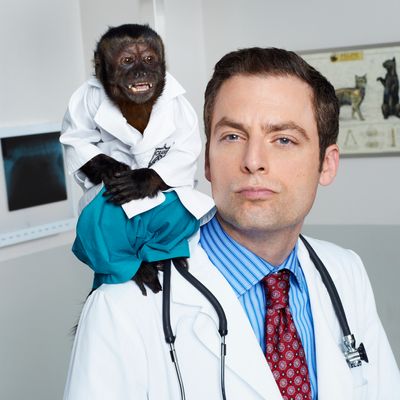
The other night on Conan, sportscaster Bob Costas took exception to NBC’s breaking into the closing ceremony of the Olympics and delaying a performance by The Who in order to show a special advanced presentation of the network’s new series Animal Practice. I agree with Costas’s assertions that the Who is of greater value than Animal Practice and shouldn’t have been pushed aside, and that Animal Practice isn’t funny. But I think he missed the most reprehensible aspect of this heavily hyped show: NBC’s desperate attempt to find ratings traction by irresponsibly exploiting the capuchin monkey named Crystal (who is called Dr. Rizzo on the show) as a prop/gag. This is both sad and obscene, especially when you realize what Crystal is put through to get laughs.
While there are several animal-related issues I could object to in this comedy about an animal hospital, I will focus here on what is so very wrong with their use of Crystal. Foremost, it is inhumane to the monkey. The University of Sao Paolo’s Dr. Eduardo Ottoni, one of the foremost experts on capuchins, explains, “For wild animals, captivity will always be a cruel practice. In the case of monkeys like Crystal, who lead complex social lives in nature, raising them in captivity means to condemn them to a life of utter loneliness.” And the oft-flashed grinlike expression on her face that looks to viewers like she is being comically mischievous is anything but an expression of mirth. “Since we do not usually understand their communicative behaviors properly, fear, submission, or avoidance displays can easily be mistaken for ‘smiles,’” adds Dr. Ottoni. In effect, this social creature has been doomed to an unnaturally solitary life in an unsuitable environment, so that it can be trained to look as if she is laughing at the unfunny jokes made by the characters on this unfunny show while what she really may be experiencing is high stress.

I asked Primate Veterinarian Dr. Mel Richardson to watch the Animal Practice pilot for his take on Crystal’s seemingly jocular mannerisms and he said, “Crystal’s natural response to a threat, sometimes called a fear grimace, has been reinforced and used in the show. This expression is often interpreted by the uninformed as a smile or laugh. But during her training, at some point the stimulus of fear had to be introduced. Though I don’t know how Crystal was trained, typically they use intimidation to get [monkeys] to make the open-mouth expression.” I then asked Dr. Richardson if he thought monkeys feel actual stress when they are making a “smile” expression as part of their act. “I think to some degree they do,” he said.
An even more negative result of Crystal’s use in Animal Practice is the almost certain increase in the purchases of monkeys as pets that will take place. Crystal’s prior appearances in The Hangover 2 and Night at the Museum have already lead to an explosion in the pet monkey population. Horrendously, one can buy a capuchin monkey over the Internet right now; after watching the show, more than a few morons will want to get one of these undomesticated animals for their home, with serious ramifications. Robert Ingersoll, President of Mindy’s Memory Primate Sanctuary, explains that “Portraying monkeys on TV shows like Animal Practice as cute and amusing misleads the public to believe that they make good pets, when in reality, countless people have been seriously injured as a result of attacks by captive monkeys. Primate sanctuaries are left to clean up the mess when people discard their pet monkeys after realizing how difficult these animals are to care for.”
When confronted on the misuse of animals for entertainment purposes, corporations like NBC and producers frequently offer two responses: (1) “But we hired people to monitor the animals on the set”; and (2) “We didn’t know we were doing anything wrong.” The American Humane Association, not to be confused with the heroic and effective Humane Society of the United States, is most often employed on film and TV productions. But their response when bad things happen, like when three horses died on the set of Luck or a trainer beat a chimpanzee about the head on the set of Speed Racer (and wasn’t even fired for this illegal act), has been so muted that it is difficult for me to see how they are doing anything to keep animal actors from harm. Further, they admittedly don’t monitor what happens to the animals off the set: I can only imagine what happens to a chimp with an abusive trainer when they are away from a hundred crew members watching them.
With NBC and Animal Practice, they can’t claim ignorance. People for the Ethical Treatment of Animals sent them letters expressing their concern and I followed up on one letter with an NBC executive. Neither they nor I ever received a response.
Even if Animal Practice were funny — and I assure you it isn’t — is a sitcom really worth harming an animal and putting people in danger by inducing them to buy dangerous pets? The main reason you may even think about watching this show is NBC’s heavy marketing push featuring Crystal, and I understand that. Monkeys are cute. But the next time you see a promo or billboard for the show, I hope you’ll think about this point by Dr. Richardson: “To me the biggest harm is [Crystal] has had her life taken away from her, and she’s going to bite someone in the end and then they won’t be using her anymore and she’ll be in a cage somewhere until she dies.”
So, if you care about animals, please, please, please DON’T WATCH THIS SHOW! I promise your life will be no less rich for missing it. And if you can Facebook post, tweet, tumbl, or communicate in any way a request to your friends not to watch it either, maybe this series will be quickly dumped and fewer of these intelligent, complex, and beautiful creatures will be mistreated or similarly dumped into sanctuaries when their naïve, sitcom-watching owners have to get rid of them because they found out that, unlike with the portrayal of Crystal’s Dr. Rizzo, monkeys are wild animals and not domestic pets.
Follow Gavin Polone on Twitter, @gavinpolone

